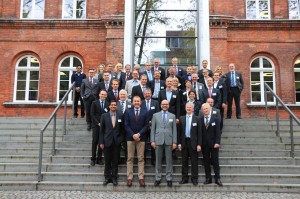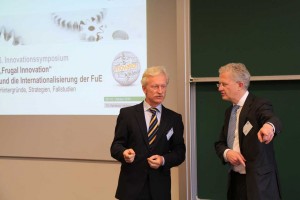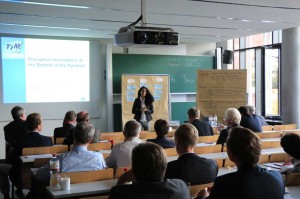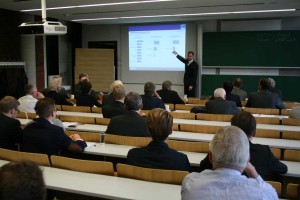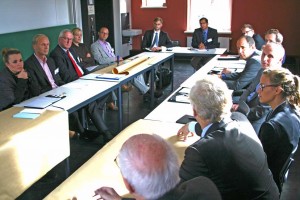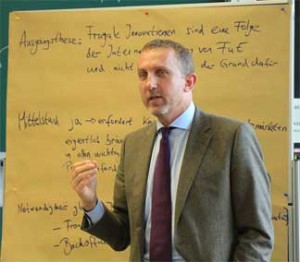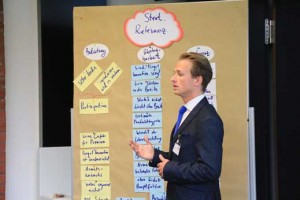A Report on the Schmalenbach-TUHH Symposium
By: Dr. Rajnish Tiwari
On the 9th and 10th October 2014 a well-received symposium on the topic of frugal innovation was held at the premises of Hamburg University of Technology (TUHH). The symposium, carrying the title “Frugal Innovation” und die Internationalisierung der FuE: Hintergründe, Strategien, Fallstudien (English title: “Frugal Innovation and the Internationalization of R&D: Backgrounds, Strategies and Case Studies”) was organized by the Working Group on Innovation Management of the Schmalenbach-Gesellschaft für Betriebswirtschaft e.V. (hereafter SG) in collaboration with the Center for Frugal Innovation (hereafter CFI) of TUHH. The symposium with close to 45 participants from the industry and academia was well-attended and saw some very interesting contributions by invited speakers. The insights generated here through a unique setting of business/academia interaction can potentially push the envelope of research and help expand the currently limited understanding of frugal innovations.
(Note: For a PDF version of this article click here, otherwise you may continue reading in HTML format)
The guests were greeted with a brief welcome note by the hosts, Prof. Dr. Hans Koller (Helmut Schmidt University, hereafter HSU) and Dr. Ulrich Lange (Chance4Change GmbH), co-heads of the SG Working Group on Innovation Management. Prof. Koller showed an inspiring video of a talk given by Amos Winter of the Massachusetts Institute of Technology (MIT) that took the participants “through the mechanics of an all-terrain wheelchair that’s cheap and easy to build — for true accessibility”. The short documentary made the participants really look forward to the program that lay ahead.
The main part of symposium began with a joint keynote address delivered by Prof. Dr. Cornelius Herstatt and Dr. Rajnish Tiwari of CFI. The keynote, titled “Frugal Innovation as a New Imperative for Success: In Emerging Markets and Eventually Also in the Industrialized Nations” (original German title: “Frugal Innovation als neuer Imperativ für Erfolg in Schwellenländern – und vielleicht auch in den Industrieländern?”) set the scene for the symposium by defining an analytical framework.

Prof. Dr. Cornelius Herstatt (left) and Dr. Rajnish Tiwari (right), standing / Photo: TIM-TUHH/Göldner
Prof. Herstatt and Dr. Tiwari, in tandem, demonstrated the need for frugality in business to ensure long-term competitiveness of German firms, especially of the Mittelstand, not only abroad but also at home. With the help of some new studies at CFI as well as the example of India’s recent, successfully completed Mars Orbiter Mission, the “Mangalyaan”, they showed how inventive analogies (i.e. rejigging existing knowledge across industrial domains and the nature) and open global innovation networks (OGINs) can foster “affordable excellence” – an idiom for marrying high-quality with cost-effectiveness.
As next, Dr. Georg Oenbrink, Head of Innovation Networks & Communications, Corporate Innovation Strategy Management of Evonik Industries AG, dwelt on the “Strategies and Challenges for Internationalization of R&D in the Chemical Industry” (original German title: “Internationalisierung von F&E in der Spezialchemie – Herausforderungen & Strategien”). Dr. Oenbrink emphasized the “increasing need and importance to internationalize innovation and to increase share of R&D in overseas”. Even though he contended that frugal innovation had not reached chemical industry so far in a big manner, he conceded that it was becoming increasingly important for specialty chemicals companies in emerging countries. He predicted that frugal innovations “will create new business opportunities in low cost / high volume (value-for-money) markets” while declaring that “Evonik is well prepared to deliver”.
Connecting to the mantra of “affordable excellence” Dr. Manfred Dürnholz, Managing Director of Bosch Emissions Systems GmbH talked about “Frugal Products and Processes – Emission concepts: Example India” (original German title: “Frugal Products and Processes – Emissionskonzepte für Schwellenländer am Beispiel Indiens”). Dr. Dürnholz, very convincingly, showed how high-tech can be employed to generate frugal solutions that not only meet but even exceed regulatory environmental norms and thus open new business avenues in a price-sensitive B2B market.
“Cross-Functional, Global Innovation Management” (original German title: “Cross-funktionales, globales Innovationsmanagement”) was the topic of the talk by Dr. Oliver Harnack, Team Leader Innovation Management, R&D Global Strategic Functions of Dräger Safety AG. Dr. Harnack said some of the Dräger products, e.g. in the categories of personnel safety, Area Monitoring and Breathing Supply, as well as in Alcohol and Drug Measurement, can be already classified as “frugal” and are a part of the product portfolio in the emerging markets. He also emphasized the role of organizational culture as an enabler of change.
Day 2 began with a very insightful and inspiring talk by Dr. Dietmar Ley, CEO of Basler AG which is in the business of making “industrial cameras for professional users”. His talk, titled “A New Vision of Value: Driving Market Change Through Lean Innovation” made a compelling business proposition for proactively ushering in disruptive changes and taking the risks head-on. One of the strategies that Dr. Ley shared with the symposium participants was about generating a competitive advantage through “the lowest total cost of ownership”.
How an established and tradition-rich, global concern can successfully embark on the path of frugal innovation, was shown by Helge Fitting from Global Prototype Management of Daimler Trucks. He represented his Indian colleagues from Daimler India Commercial Vehicles Pvt. Ltd. and delivered a talk on the development of an India-specific truck, namely the “BharatBenz”. His talk with the title “The BharatBenz Product approach: Custom Tailored Truck Concepts for the Indian Domestic Market” provided rich insights into the product development process.
Dr. Hans-Ludwig Schubert, Senior Vice President at VOITH Paper GmbH, in his talk “Made Locally – Satisfying Customer Needs Globally” (original German title “Made vor Ort – Kundenbedürfnisse global erfüllen”) combined elements of strategic considerations in adopting frugal innovations at a global level, and not just in the emerging markets, while showing how a relatively large Mittelstand company can shed organizational slack and tread the frugal path overcoming organizational challenges. His talk too threw much light on change management within organizations.
Whereas most industry speakers at the symposium had represented examples from German firms, Dr. Aditi Ramdorai from McKinsey Global Research Institute, who recently completed her Ph.D. from CFI/TUHH, expanded this view to overseas firms. In her talk titled “Disruptive Innovations in Healthcare for the Base of the Pyramid” she presented case studies of Aravind Eye Care, Narayana Hrudayalaya, Tata Chemicals and GE Healthcare to showcase how established firms can engage in disruptive innovation to stay ahead in the emerging markets while also leveraging those products in the industrialized countries by the means of “reverse innovation”. Her talk also entailed valuable insights on implementing organizational changes that foster frugal innovations, one of the motivations being social welfare.
This fitted well with the talk of Ms. Edda Schröder, Managing Director of Invest in Visions GmbH, who the previous evening had talked about the need for social engagement in the developing world to foster financial inclusion (original German title: “Die Berücksichtigung des Impact beim Engagement in Schwellenländern”).
One highlight of the symposium, in the opinion of this author, was that a questionnaire-based survey of the symposium participants was conducted on the first day. The purpose was to assess their current understanding of frugal innovation and their engagement with them. Since much of the research on frugal innovations so far has worked with case studies of successful products, there has been a general lack of ideas from a broader basis. The symposium participants were asked about their motivation and the challenges faced in implementing a frugal innovation strategy in their companies. They were also asked about the support they wish to receive from the management research at universities. The questionnaire prepared at CFI was evaluated overnight and the results presented to the audience next morning by Timo Weyrauch, doctoral candidate at CFI/TUHH.
Based on the results of the survey, 3 workshops were held on the second day in the format of “World Cafés” that enabled in-depth discussions amongst the participants on the following three topics:
- Workshop 1: Internationalization of R&D, (original German title: “Internationalisierung der FuE”) moderated by Dr. Stephan Buse (CFI) and Michael Zeng (HSU)
- Workshop 2: Strategic Relevance of Frugal Innovations, (original German title: “Strategische Relevanz frugaler Innovationen”) moderated by Prof. Dr. Cornelius Herstatt (CFI) and Björn Hoppe (HSU)
- Workshop 3: The Innovating Process for Frugal Innovations, (original German title: “Innovationsprozess frugaler Innovationen”) moderated by Dr. Rajnish Tiwari and Timo Weyrauch (both CFI)
These discussions generated some very valuable insights about the perception and understanding of frugal innovations in German companies and the challenges associated with them. They also revealed some new interesting open research questions for industry/academia collaboration. The detailed results will be published in due course by CFI.
In this connection Prof. Herstatt and Dr. Tiwari also called upon firms and other interested institutions to join the frugal innovation research at CFI. They offered setting up of working groups (“Arbeitskreise”) to collaborate within product development processes and to enable mutual learning effects. They also announced plans to set up an Advisory Council (“Beirat”) for CFI that would help identify emerging research gaps and enable impulses.
Last but not least, they also exhorted the participants to join the two social media groups they have set up for fostering exchange of ideas on the topic of frugal innovations. The two groups are as follows:
- Linkedin Group: “Frugal Innovation: Mastering the Challenge”
http://www.linkedin.com/groups/Frugal-Innovation-Mastering-Challenge-7417611 - Facebook Group: “Frugal Innovation” https://www.facebook.com/groups/235545019948109/
Summarizing, it was a very successful and satisfying symposium that enabled new impulses for business firms and research institutions alike.
For further information the interested reader should feel free to contact the CFI team, including this author. All coordinates are available under: www.frugal-innovation.net, and www.tuhh.de/tim
—
Note: The Press Division (“Pressestelle”) of the Hamburg University of Technology (“Technische Universität Hamburg-Harburg”) issued a press release in German to summarize the event. The release titled “Weniger ist mehr: TUHH-Symposium zu frugalen Innovationen” (15.10.2014) can be accessed online:
http://intranet.tuhh.de/aktuell/pressemitteilung_einzeln.php?id=9685&Lang=de

